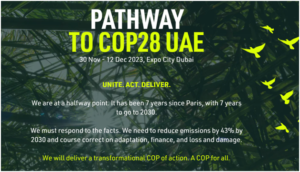CoP-28 Faces Pre-Conference Challenges
Relevance
- GS -3: Conservation, Environmental Pollution and Degradation, Environmental Impact Assessment.
- Tags: #CoP28ClimateAction #ClimateFinance #ClimateJustice #ClimateCommitments #GlobalClimateSummit #UPSC #MintEditorial #currentaffairs.
Why in the News?
Dubai is set to host the 23rd United Nations Climate Change Conference, known as CoP-28, where global leaders will discuss climate commitments and strategies. However, concerns arise regarding the effectiveness of these conferences, given recent policy shifts and complexities in climate finance and carbon offset markets.
UN Climate Conference in Dubai: High Hopes, Familiar Patterns
- Dubai is set to host the 23rd United Nations Climate Change Conference, including CoP-28, from November 30 to December 12.
- While there’s optimism, there’s also skepticism. World leaders may promise change, but follow-through often falls short.
- Global corporations may resist rapid decarbonization, and advanced nations might evade reparations for historical emissions.
- The conference’s goal is to translate pledges into significant climate change action, among the customary chances for pictures and blame-shifting.
- The world watches, hoping for a departure from past cycles of promises and disappointments.
UAE’s CoP-28 Goals: Paradigm Shifts for Climate Action
Sultan Ahmed Al Jabar, the UAE’s special envoy for climate change and CoP-28 president- designated urges CoP-28 participants to prioritize four key shifts
- Accelerating the energy transition and emission cuts by 2030.
- Revamping climate finance commitments.
- Emphasizing people and nature in climate efforts.
- Fostering inclusivity in the conference’s proceedings.
These objectives aim to drive meaningful climate action and progress during CoP-28.
CoP-28 Prospects: Early Indicators Raise Concerns
- G20 meetings in Goa and Chennai, along with recent developments and policy complexities, raise doubt on CoP-28’s potential for substantial impact.
- The path ahead remains uncertain, raising questions about the conference’s effectiveness in leaving a lasting mark on climate action.
The uncertain picture has been made worse by two recent occurrences and policy concerns
First – UK’s Climate Commitment Rollback
- Prime Minister Rishi Sunak extended deadlines for key climate commitments.
- Deadline for phasing out these vehicles moved from 2030 to 2035.
- Gas Boilers to Heat Pumps: Replacement timeline extended, affecting household emissions reduction.
- Criticism: Sunak’s decisions criticized for diluting UK’s 2050 net-zero targets.
- Political Motive: Accusations of aligning changes with upcoming British general elections for political gain.
EU’s Carbon Border Adjustment Mechanism (CBAM)
- Trade Barrier Introduction: EU’s CBAM imposes tariffs on carbon-intensive imports like steel, cement, and fertilizers.
- Objective: Aims to create fairness by aligning with EU’s carbon credit certificate system.
- Historical Accountability: EU historically avoided responsibility for climate change but now shifts greening costs to other nations, mainly developing countries.
- Global Implications: CBAM impacts international trade dynamics and climate responsibilities.
Challenges in Carbon Credit Offset Market
- Offsetting Emissions: Manufacturers use carbon credits to compensate for their carbon dioxide emissions through emissions reduction projects.
- A joint analysis by Corporate Accountability and The Guardian reveals issues with top 50 emission offset projects.
- Dubious Environmental Benefits: Findings suggest many projects exaggerate their environmental impact or lack genuine benefits.
- Report highlights that $1.16 billion in carbon credits came from likely “junk” projects, with an additional $400 million potentially in the same category.
- Concerns: The carbon credit market has faced issues, enabling polluters to exploit it.
- The EU’s CBAM, rooted in this flawed system, appears unfair when imposed on importers from developing nations, questioning climate justice.
Second – Need for Finance for transition
- The finance necessary for switching to non-polluting energy sources is where the second policy issue is located.
- In a letter to all parties, the CoP-28 president-elect states that poor nations must have access to inexpensive, readily available climate Finance.
- We are aware that the existing system of international finance is has gaps and provides in adequate solutions.
- Emerging and developing nations will require yearly investments in climate action totaling more than $2.4 trillion through 2030 if we are to meet the objectives of the Paris Agreement.
- It is really a tremendous sum of money—roughly $17 trillion.
- Promises of money have already been broken by advanced nations.
- The multilateral development banks and development financial organizations lack the resources necessary to offer the magnitude of funding needed.
- Private investment has therefore become the front-runner for bridging the gap.
However, the wave of support for private capital is growing (somewhat similar of the pre-2008 demand for mortgage-related derivatives), but it seems to ignore its inherent limitations or refuses to even entertain the thought that it cannot completely replace public finance and will only be effective as a part of blended finance. A reality check should come from the CoP-28 leadership.
Source: Livemint
Mains Question
Assess the role of the carbon credit offset market in promoting climate justice. What are the key reforms required to make this market more effective and transparent?





